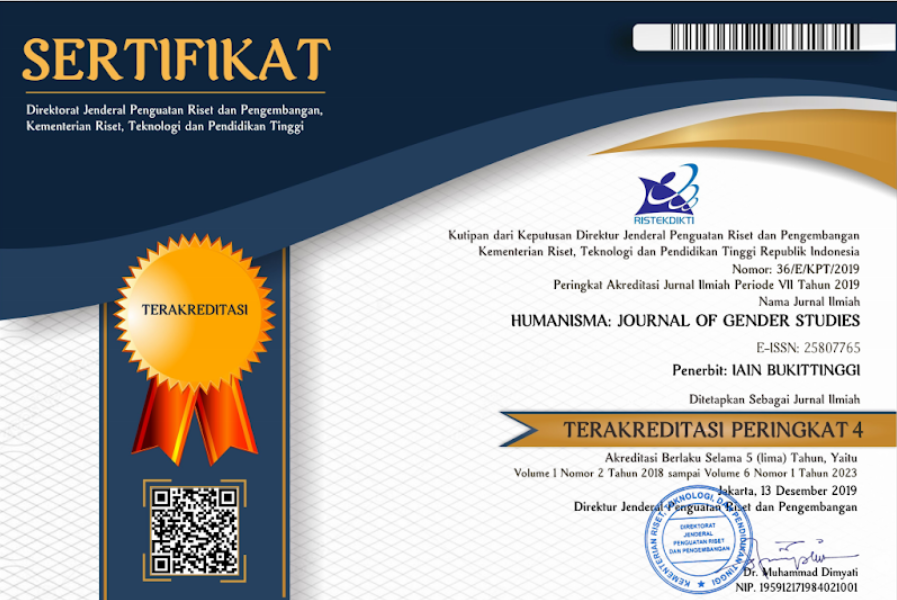Injustice Continuity: Gender Inequality in Japan in the 21st Century
DOI:
https://doi.org/10.30983/humanisme.v5i1.4355Keywords:
Gender Inequality, Gender, Woman, Womenomics,Abstract
The issue of gender equality is still a problem attached to the Japanese economic, social, political, and cultural system. The movement for Japanese liberation efforts and strived since the middle of the twentieth century is still stagnating. This problem remains inseparable from how stakeholders maintain a conservative thought. Women in the domestic sphere and women are the person who does not have the capacities as men are still the basis for reason. This paper will review how gender inequality is still a severe issue that needs to be fought for in the twenty-first century.
Isu kesetaraan gender masih berupa permasalahan yang erat melekat dalam sistem ekonomi, sosial, politik dan budaya Jepang. Pergerakan upaya liberasi Jepang yang telah diperjuangkan sejak pertengahan abad ke dua puluh sampai saat ini masih mengalami stagnansi. Keberlanjutan isu ini tidak terlepas dari bagaimana sebuah konstruksi berpikir konservatif tetap dipertahankan oleh pemangku kepentingan. Perempuan dengan ranah domestik dan perempuan tidak memiliki kapasitas yang mumpuni daripada laki-laki masih menjadi dasar berpikir dalam permasalahan ini. Tulisan ini akan mengulas bagaimana isu ketimpangan gender masih merupakan isu serius yang perlu diperjuangkan di abad ke dua puluh satu.
References
Coleman, Liv. 2016. Will Japan “Lean In†to Gender Equality?.U.S.-Japan Women’s Journal, 2016, No. 49 (2016), Hal. 3-25. University of Hawai’i Press
Dezsö, Christian L. dan David Gaddis Ross. 2012. Does Female Representation in Top Management Improve Firm Performance? A Panel Data Investigation. Strategic Management Journal, Vol. 33, No. 9, hal 1072-1089: Wiley
Hasunuma, Linda C. 2015. Gender Gaiatsu: An Institutional Perspective on Womenomics. U.S.-Japan Women’s Journal, 2015, No. 48 (2015), Hal. 79-114. University of Hawai’i Press
Kingston, Jeff. 2013. The Illusion That is Abenomics. Economic&Political Weekly
Matsui, Machiko. 1990. Evolution of the Feminist Movement in Japan. The John Hopkins University Press
Pedersen, Martin Taarn. 2013. Girl Power in Japanese Boardroom? An Exploratory Study of Critical Masses Impact of Firm on Financial Performance. Journal of International Affairs Editorial Board
Schieder, Chelsea Szendi. 2019. A “Necessary Evil� Keeping Women Out of Medical Schools Won’t Fix What Ails the Japanese Medical Profession. The Asia-Pasific Journal: Japan Focus. Vol. 17, Issue 7, No. 2.
Shim, Jaemin. 2018. Mind the Gap! Comparing Gender Politics in Japan and Taiwan. German Institute of Global and Area Studies.
Song, Jiyeoun. 2015. Economic Empowerment of Women as the Third Arrow of Abenomics. Journal of International and Area Studies, June 2015, Vol. 22. No. 1 (June 2015), hal. 113-128. Institute of International Affairs, Graduate School of International Studies, Seoul National University
Online Reference
https://www.japantimes.co.jp/news/2021/03/27/national/mori-sexist-remark-women/, diaksesJumat, 21 Mei 2021
https://www.dw.com/en/japan-gender-equality-sexism/a-57102279, diaksesJumat, 21 Mei 2021
https://www.nytimes.com/2021/02/18/world/asia/yoshiro-mori-tokyo-olympics-seiko-hashimoto.html, diaksesJumat, 21 Mei 2021
https://thediplomat.com/2021/02/tokyo-olympics-mori-to-leave-but-gender-issue-remains/, diaksesJumat, 21 Mei 2021
Downloads
Published
How to Cite
Issue
Section
Citation Check
License
Authors who publish with this journal agree to the following terms:
- Authors retain copyright and grant the journal right of first publication with the work simultaneously licensed under a Creative Commons Attribution-ShareAlike 4.0. that allows others to share the work with an acknowledgment of the work's authorship and initial publication in this journal.
- Authors are able to enter into separate, additional contractual arrangements for the non-exclusive distribution of the journal's published version of the work (e.g., post it to an institutional repository or publish it in a book), with an acknowledgment of its initial publication in this journal.
- Authors are permitted and encouraged to post their work online (e.g., in institutional repositories or on their website) prior to and during the submission process, as it can lead to productive exchanges, as well as earlier and greater citation of published work (See The Effect of Open Access).



